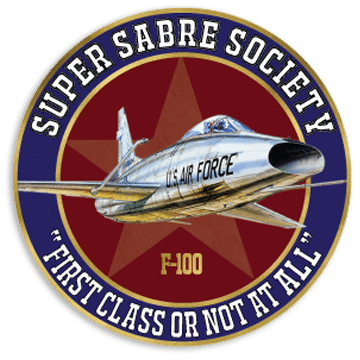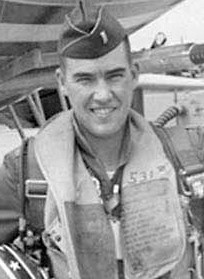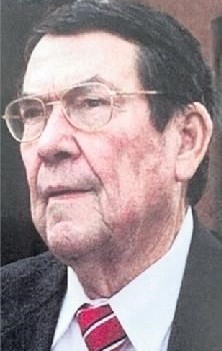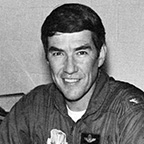Biography
From Chained Eagles, The Story of Col. Jack Van Loan and the Vietnam POWs in North Vietnam
“Being a prisoner is not in itself heroic. This situation usually starts as an unfortunate turn of events and in the beginning makes the subject merely an unfortunate victim of the vagaries of fortune. However, the manner in which a man responds and adjusts to the tremendous pressures and tribulations in which he finds himself, reveals his true character.”
May 19th
I found out later that the 19th of May had been a really bad day for a lot of people, not the least of which was the Navy. There had been six or eight losses that day. They were all stacked up in the interrogation room.
Eventually, maybe 10 at night, somebody grabbed me and hauled me into what we came to know as the knobby room. It had great big knobs of plaster of Paris on the walls, used for dampening sounds so our screams of pain wouldn’t be easily heard throughout the prison. I didn’t know that at the time, of course. To me, it appeared to be just an interesting presentation, a way to decorate a room.
There were some ropes in there but there was no urinal, there was no pot, no nothing. There was just a table and a couple of chairs behind it and a stool in front and they told me to sit on the stool. So I sat down and waited. After some considerable period of time, maybe 45 minutes, in came what I took to be a couple of officers. I didn’t know for sure if they were officers. They were wearing brown tunics with some kind of little epaulets on them.
One of them spoke English and he said, “What is your name?” I told them my name and my rank, major service number, and my date of birth.
Then he said, “What was your aircraft?” And he started into these more specific questions. I kept repeating, name, rank, service number and date of birth.
Finally, he said, “That is not going to suffice. You’re going to have to talk to us. Here are the camp regulations and they were very clear that all prisoners were to show a good attitude and answer all questions fully and honestly.” It was all B.S.
I told him I was required by the Geneva Conventions only to give him name, rank, service number and date of birth. Then the guy literally exploded. He screamed, “The Geneva Convention does not apply.” I asked why not and he said, “You are criminals, this is an undeclared war and you have attacked our country and you are not going to be treated according to the Geneva Convention. You are going to talk to us or we’re going to punish you because you are violating the camp regulations.”
I didn’t know what the hell to say. My knee was hurting pretty badly and I was thinking to myself, “Jeez, I really took a wrong turn here,’’ but there was not a hell of a lot I could do. He kept asking me questions, zeroing in on targeting. That really bothered me. I had spent three years in Japan sitting alert on nuclear SIOP (Single Integrated Operations Plan) targets and I was scared half to death they were going to start asking me about the nuclear targets. That was pretty dangerous stuff. I had sat on Peking as a target, more than once.
The truth was that nuclear targets were the least of my damn worries, but I didn’t know that at the time. They didn’t give a damn about the SIOP. I never once heard the SIOP mentioned in the six years I was there.
But they really were concerned about targets in North Vietnam, specifically what the upcoming targets were going to be. It was just incredible how stupid this was. I had been on a target selection board in the 8th Wing. I was one of the three members of that group, the majority of whom were Fighter Weapons School graduates. Though I’m not an FWS graduate I was a distinguished crewman … and had the credentials to serve on that committee. I knew the next 12 targets that the 8th Wing was scheduled to strike.
There was just no damn way I was going to tell them what those targets were. I said to myself, “That ain’t gonna come out of your mouth.” We had seen that the North Vietnamese were moving SAMS and anti-aircraft guns around to different locations and we didn’t know why. The intelligence guys told us it was a result of some kind of information the North Vietnamese were getting.
I was about to find out the source of that intelligence. It was coming from the POWs, guys who were captured and were telling them about the next targets. It became obvious that I was scheduled to be the next source. I just thought, “By God, I’m just not going to do that.”
About that time, a very muscular guy came in. He was sort of small but, I’ll tell you, he was as strong as a sadistic ox. He knocked me off the stool, grabbed ropes and proceeded to tie me up. He put manacles on me, with my hands behind my back. He put my feet in irons, with a metal bar running behind my ankles, perpendicular to my body. They jammed a rag into my mouth to stifle screaming. Boy, he cinched up those ropes really tight. The two officers were sitting there and one said, “When you’re ready to talk, we’re ready to listen.”
That got pretty exciting. Then they put a rope around my neck and I thought, “You know, I’m in real trouble here. I’m in more trouble than I’ve ever been in my life.” I just thought, “Jesus, I can’t talk and I can barely breathe. One false move and I’m dead.”
And I found out many years later in a book titled, “Inside Hanoi’s Secret Archives,” by Malcolm McConnell, that their deepest darkest secret was how many prisoners they killed in interrogation. I’m here to tell you that I went through that and there was no question about it. They didn’t have to make much of a mistake and I was going to be a dead bunny.
I wasn’t going to tell them about those targets, but I was going to have to come up with something. I tried to knock myself out by beating my head on the floor but that didn’t work out. All I was doing was bloodying up my forehead and getting blood in my eyes.
I was thinking, “Lord, I need some help here.” It flashed through my mind what Franklin Roosevelt had said at Chicago when he said, “We have nothing to fear but fear itself.” How the hell that ever chose to go through my mind at that particular time I’ll never know.
A substantial number of POWs were killed in interrogation and now they had me in the ropes. A lot of people had been seen on the ground after bailing out who just disappeared. I know now what happened to them. They went into the knobby room and they died there. That was almost my fate, too. They were all business, and they were dead damn serious.
I was sort of detached. I heard all this screaming and I thought, “My God, somebody is really getting hurt.” I realized the person screaming was me. It was scary as hell. I had never had anything like that happen to me and it went on for what seemed like hours. I don’t think it was actually that long now. I think it was about 45 minutes, maybe an hour.
I just was a total mess … They attached a rope around my arms which were tied together behind my back, elbows touching and threw it over a hook in the ceiling. They hauled me up off the ground and began bouncing me up and down.
This dislocated my right shoulder. I had just never, ever experienced any pain like that. I just didn’t think that it was possible. I finally screamed that I would talk and the officers came back in. I was semi-conscious. I was in and out. I have no idea how long that went on.
Finally, the little guy who had tied me up loosened the bindings a little bit. Releasing the ropes caused the pain to be excruciating as the blood rushed back into my arms. The ropes had cut into my left arm. My right shoulder was dislocated and I was a … disaster. I was on my hands and knees. That was all I could do. I couldn’t stand, I couldn’t do anything. I lost all circulation in my hands, my arms and my feet. To this day, if it gets below 55 degrees both of my hands just turn white. I don’t have circulation in my hands at all. There are a whole bunch of us who don’t.
Then they pulled the rag out of my mouth. I had damn near strangled on it and I threw up at that point. I was a basket case, crawling around on my hands and knees with blood everywhere.
They told me to get back on the stool. I thought, “You gotta be (expletive) me. I can’t get off the ground.” Then the guy kicked me a couple of times in the (groin) just for emphasis and that spurred me. I finally managed to crawl up on the stool. I was sitting there just crying my eyes out. I had never ever been hurt like that before in my life.
After I came home they finally came up with a surgical procedure to alleviate the pain, but it isn’t worth doing unless you are really and truly having problems. My arms go to sleep, my hands go to sleep just if I lie on it in bed. It’s still scary now when that happens and it was terrifying as hell at the time.
Coming Home, 1973
The time had finally come.
We realized that we were actually going to be going home. It was beyond belief. We were taken out of our rooms and then the North Vietnamese told us to dress in going home clothes they had for us to wear. We had shoes for the first time in years, a cotton jacket, cotton shirt, cotton pants. We put everything on.
The Four Power Commission was there: The Poles, the Canadians, the Indians and I can’t remember who else, maybe it was the Czechs. They came in and they met each one of us. The Canadians, of course, were great to be around and we were all lined up there, by our beds talking to them.
They had us walk outside then and started calling off our names. When each individual name was called that guy went over and got in line. And as military men we marched out of the Hanoi Hilton and into the sunlight of freedom.
They had buses outside, and a huge crowd was gathered. They were as quiet as mice. Nobody was gesturing to us. The Vietnamese had made a big deal out of telling us not to make any demonstration when we were released. In other words, don’t flip off the crowd. …
We got on the buses, small buses, and we went across the Paul Doumer bridge. They stopped short of Gia Lam airport in a kind of holding area. I assume it was where passengers assembled when they came in.
They brought out cookies and beer. It was in the morning and I don’t drink in the morning and I very seldom drink beer at all. But that morning I had a sip and a couple of cookies.
Then we got back on the buses and headed out onto the hardstand. There were two or three C-141s out there. A full colonel by the name of Bennett … was there. We all got lined up again … and as each name was called that guy would step across an imaginary line and salute Colonel Bennett. Then he would shake the man’s hand.
Each one of us was personally escorted out to the C-141 by a crewman. They were going back and forth walking us into the airplane and to our seats. We were disoriented. Of course, we were happy, we were ecstatic, but we were dazed. What do you say?
We sat down and pretty soon the engines were started and somebody was standing up. The loadmaster said, “Everybody sit down and buckle up,’’ but this one guy didn’t. Then the loadmaster hollered, “Well, hang on to something.” When we got out to the end of the runway a couple of the guys were still standing up and he yelled out, “Here we go. Hang on.”
That was probably the first time a C-141 ever took off with everybody not seated and strapped in. Of course, when we broke ground everybody was whooping and hollering. The aircraft commander called as we crossed the North Vietnamese coast outbound and he said, “We are now feet wet.” (Over the South China Sea).
Everybody just went crazy.
(source: Https://www.thestate.com/news/local/military/article28620496.html)
Jack Linwood Van Loan (Col USAF, Ret), “Headed West” on October 13, 2019
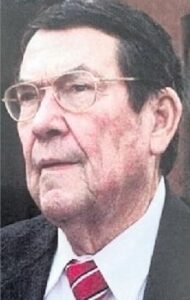 Col Van Loan of Columbia, SC was born December 16, 1931 in Eugene, Oregon to his late parents, Wendell Linwood Van Loan, PhD and Lillian Schroeder Van Loan, PhD. At the age of 87 he peacefully passed away at home surrounded by family.
Col Van Loan of Columbia, SC was born December 16, 1931 in Eugene, Oregon to his late parents, Wendell Linwood Van Loan, PhD and Lillian Schroeder Van Loan, PhD. At the age of 87 he peacefully passed away at home surrounded by family.
Jack is survived by the love of his life, best friend and wife Linda; brother James Wendell Van Loan (Sharon); six children Steven, Glenn and Douglas Van Loan, Brian Black, Holly Black and Megan Ruppert; 19 grandchildren; and many nieces, nephews and great-grandchildren.
Jack graduated from Oregon State University in 1954, then began a highly distinguished 30 year career in the United States Air Force. During his career as fighter pilot, Jack served 6 heroic years interned as a POW in Viet Nam.
Upon return he was promoted to rank of Colonel and finished his career as Director of Operations for the Ninth Air Force. Jack retired in 1984. He moved to Columbia and quickly became enamored with South Carolina and the area.
For 20 years he served as Executive Director of the Five Points Association. The City of Columbia and Five Points Association honored him as a patriot and for his service to the community with a statue in Centennial Plaza.
A memorial was held on Saturday, October 26, 2019 at Five Points Centennial Plaza, 701 Santee Avenue, Columbia, SC, where a statute of Col Van Loan stands.
In lieu of flowers the family asks that memorials may be made in Jack’s name to one of the following: local community safety organization Serve & Connect serveandconnect.net; Wounded Warrior Project woundedwarriorproject.org; or Heartstrings Hospice www.heartstringshospice.com
Published by The State on Oct. 20, 2019.
Source: Jack Van Loan Obituary (1931 – 2019) – Columbia, SC – The State (legacy.com)
